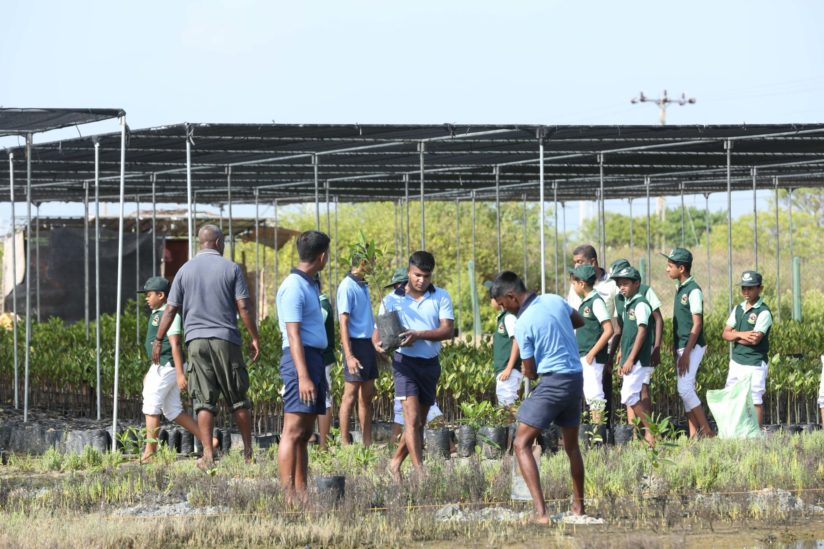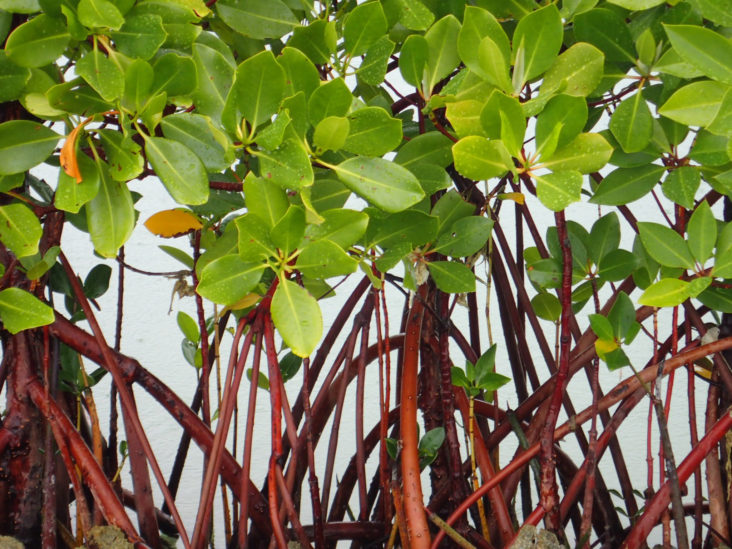We are often asked whether or not Seacology projects combat the global climate crisis. The answer is an emphatic yes.
Islands often bear the brunt of rapid climate change. We see the enormous impact of climate change all the time, on islands all over the world. For millions of islanders, climate change is already a stark daily reality, not an abstract question subject to debate. For example, take the quiet village of Korolevu, in the South Pacific nation of Fiji. It sits next to a beautiful bay, where residents have fished for generations. But the sea level is rising, tides are getting bigger, and the houses by the water are too dangerous to live in. In an agreement with Seacology, the village promised to both protect both its forest and set aside part of the bay as a no-fishing zone. In return, Seacology is funding a small community center, the village’s only public building—uphill, on safer ground.
-

Members of Sri Lanka’s navy assist with mangrove replanting
Seacology’s biggest project—the five-year effort to protect all of the mangrove forests in the entire country of Sri Lanka—shows how we’re tackling the causes of climate change. Mangroves, resilient trees that grow on the coasts of many tropical and subtropical islands, are a critical weapon in the fight against global warming. Acre for acre, they trap many times more carbon than do other forest ecosystems, so saving and replanting these trees pays huge dividends for our planet.

Many of our smaller projects also involve mangrove protection. But that isn’t the only way Seacology focuses on climate change. In fact, almost every Seacology project helps ameliorate climate change. Just a few examples:
- Working with Seacology, a Malaysian village decides to protect a chunk of mountainous forest instead of letting loggers or oil palm companies clear it. This prevents a large amount of carbon from being released into the atmosphere. Keeping the forest healthy means that its streams keep flowing, and Seacology provides funds for the village’s first freshwater supply system.
- A coastal community on a Thai island pledges to protect offshore seagrass beds, which, like mangroves, keeping huge amounts of carbon from escaping into the air. (Seagrass ecosystems are also the habitat of endangered dugongs, the Asian cousins of manatees.) Seacology funds a conservation center to educate youth and other community members about this key ecosystem.
- Seacology funds training for Dominican Republic communities that want to foster responsible ecotourism. This gives the communities an economic incentive to protect the carbon-trapping forests and the abundant wildlife they sustain, which tourists come to enjoy.
The overwhelming scientific consensus is that climate change is by far the most serious global threat of our time, and that it disproportionately hurts poorer communities. The island communities we work with didn’t cause the problem, but they are taking steps, and often making substantial sacrifices, to face this existential danger. We are proud to walk beside them.

